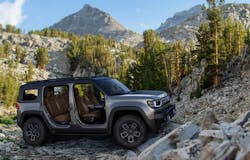Stellantis announced today that it would begin moves to make its Jeep brand of SUVs more electric. In a video announcement posted Thursday, September 8, Jeep announced the brand would introduce four battery-powered SUVs in North America and Europe before 2026. The company also said it would seek to improve sales of its electric-powered vehicles to 50% of total sales in the U.S. and 100% of its sales in Europe by 2030.
In statement, Christian Meunier, the CEO of Jeep, said the new moves are prompted by the success of the brand’s plug-in hybrid Wrangler 4xe.
“Driven by the success of our electrified 4xe portfolio in North America and Europe, we are designing and developing the most capable and sustainable JEEP SUVs to date,” Meunier said.
Jim Morrison, chief of Jeep North America, added that the brand’s North American branch’s “full lineup will be electrified, including four all-electric vehicles competing in the heart of the marketplace.”
In the announcement, Jeep revealed it would sell new full-electric versions of its Recon, Wagoneer, and Avenger brands. Production of the Recon and Wagoneer models, the first full electric vehicles to be offered in the U.S. by Jeep, will start in North America in 2024. Jeep said the Avenger would debut at the Paris Motor Show October 17, and would be introduced in Europe and Asian markets by early 2023.
Jeep’s push to electrify comes after General Motors and Ford, fellow U.S. automakers, have already announced ambitious plans to switch sales to entirely or mostly battery-electric sales within the next decade. In announcements in March, Stellantis CEO Carlos Tavares announced an initiative for sales of Jeep’s electric-powered vehicles to reach 50% of total sales in the U.S. and 100% of its sales in Europe by 2030, and for Stellantis as a whole to achieve net zero carbon emissions by 2038.
About the Author
IW Staff
Find contact information for the IndustryWeek staff: Contact IndustryWeek
